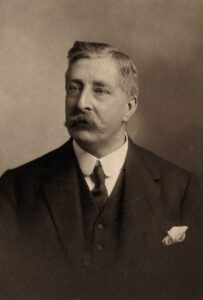
William Cash Reed
Image Source: Wellcome
William Cash Reed M.D. C.M. (19 April 1850 – 6 October 1928) was an orthodox physician who converted to homeopathy to become a Gynaecologist at the Liverpool Hahnemann Homeopathic Hospital, Physician at the Plymouth, Devon and Cornwall Homeopathic Dispensary and Cottage Hospital, and a Fellow, Member, and President of the British Homeopathic Society.
William Cash Reed was a student of, and clerk (dresser) to, Joseph Lister, who taught many students who became homeopaths, including Alfred Midgley Cash (one of Joseph Lister’s dressers), Alfred Edward Hawkes, William Henderson, John Moorhead Byres Moir, Frederic Neild, Gilbert Dewitt Wilcox and many others.
William Cash Reed practiced in Plymouth, at 2 Athenaeum Street, 9 Princess Square, and 8 Queen Anne Terrace, and later in Liverpool.
William Cash Reed was born in London in April 1850 to Quaker Alexander Reed (1817 – 1884) and Selina Cash (1822 – 1874).
Cash Reed studied medicine at the University of Edinburgh. In 1877, he was awarded the Masters degree in surgery (C.M.) and three years later, in August 1880, obtained his M.D. with a thesis titled “Heart-Disease in Childhood: A Clinical Study.”
After serving as House Surgeon at the North Eastern Hospital for Children in London in 1879, Cash Reed briefly served as ships surgeon on Indian merchantmen, before settling in Plymouth, Devon.
Cash Reed was partly involved in the establishment of the new Devon and Cornwall Homeopathic Dispensary (later, Hospital) and served as the first Medical Officer there, with the support of the founder and Honorary Physician, the Quaker homeopath Dr. Frederic Neild. Cash Reed remained with the Plymouth Dispensary and Hospital for the next twenty years.
In May, 1886, Willliam Cash Reed married Eleanor Winifred Maud Higham (1864 – 1953), at Charles Church, Plymouth, where he served as lay reader. They had three children: Selina Gladys (1887 – 1976), Bellamy Alexander (1888 – 1965), and Rose Eleanor (1890 – 1936).
Cash Reed became a highly respected figure in homeopathic medicine, and a prominent member of the profession in the south-west of England. In March 1893, he was one of the physicians, alongside Alfred Midgeley Cash of Torquay and Samuel Henry Woodgates of Exeter, who attended veteran homeopath Dr. Charles Hills Mackintosh during his final illness.
Like many homeopaths, William Cash Reed was a staunch opponent of animal vivisection. In December 1898, he was one of those present at the founding of the Plymouth branch of the National Anti-Vivisection Society, and his remarks in support of the new branch were published in the Western Morning News.
In 1900, Cash Reed relocated to Liverpool where he entered into private practice with John Davey Hayward, son of veteran homeopath John William Hayward, and joined the medical staff at the Liverpool Hahnemann Homeopathic Hospital. Cash Reed also held other appointments in the city, including the Seafaring Boys’ Home.
Cash Reed was a Fellow and an active member of the British Homeopathic Society, and was elected President in 1908.
During the First World War, Cash Reed was a sponsor of the Robert Smith bed at The Anglo-French-American Hospital (Hôpital Militaire Auxiliaire, No. 307), based at Neuilly-sur-Seine in 1915-1916.
In 1923, Cash Reed retired to Exmouth, where he occasionally worked as cardiac consultant. He became involved with the St John Ambulance, and devoted much of his attention to the welfare of prisoners at Exeter gaol.
William Cash Reed contributed cases and articles to various homeopathic publications, including Ectopic Pregnancy and Other Subjects in The Homeopathic Journal of Obstetrics, Gynaecology and Paedology.
William Cash Reed died on 6 October 1928, in St Thomas, Devon. His Obituary was published in The Lancet on 20 October 1928.


Leave A Comment